

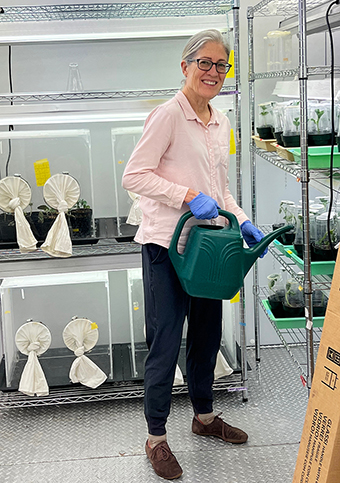

Nancy A. Moran is the Raymer Endowed Chair in Integrative Biology at the University of Texas-Austin. She completed her doctoral degree in Zoology (1982) at the University of Michigan, and previously served on the faculties of the University of Arizona and Yale University. Her honors include membership in the US National Academy of Sciences, the American Academy of Arts and Sciences, a MacArthur fellowship, and the International Prize for Biology. She has been president of the Society for the Study of Evolution and has served on the editorial board of numerous journals, currently including Proceedings of the National Academy of Science and PloS-Biology. Moran’s primary research focus is on the interactions of insects with microbes, including endosymbiotic bacteria and gut microbiomes. She uses genomic and experimental approaches to explore how symbioses have shaped insect evolution and continue to affect insect populations. She has documented the ancient associations of insects with symbiotic bacteria, and the extreme changes in genomes and in ecological niches that result from symbiotic associations. She discovered endosymbionts that benefit insect hosts by protecting against parasites. More recently she and her research group have characterized the distinctive bacterial gut communities in honey bees and other social bees, documenting their roles in bee biology and the evolution of bees. Altogether, she has published about 300 scientific papers and has mentored many excellent young scientists who have continued to study insects in their independent laboratories.
The University of Texas at Austin, USA
August 26 (Mon)
8:15AM-9:15AM
Title: The Tangled Bank of Insect-Microbe Symbiosis
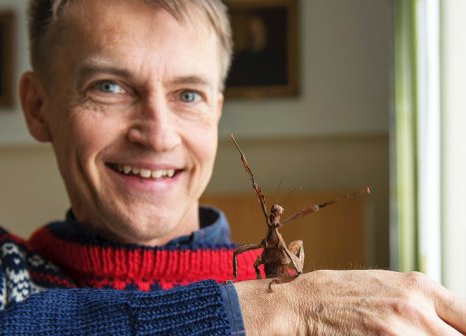
(c) Bengt Olofsson, Naturhistoriska riksmuseet

Fredrik Ronquist is a Professor of Entomology at the Swedish Museum of Natural History in Stockholm. He worked on the morphology, systematics and evolution of gall wasps and their parasitic relatives for his PhD at Uppsala University and became interested in computational phylogenetics when trying to address problems in the evolution of gall wasps and in the evolution of insect-host plant associations more generally. With John Huelsenbeck, Ronquist developed MrBayes, a popular software package for Bayesian phylogenetic analysis. Subsequent work in this direction has focused on more generic tools for Bayesian inference, most recently using universal probabilistic programming. In his insect research, Ronquist has studied evolution and diversity from several different perspectives. The evolution of insect–host plant associations has been a central theme, as well as the study of the systematics and diversity of poorly known groups of Hymenoptera and Diptera. Recently, his empirical research has focused on comparative analyses of insect faunas using “deep metabarcoding” in the Insect Biome Atlas project. Ronquist is a member of the Royal Swedish Academy of Sciences and the Scientific Council of the Swedish Research Council. He is also chairing the Station Linné Foundation, a non-profit running a field station on Öland focused on insect diversity research.
Website: https://ronquistlab.github.io
Website: https://www.stationlinne.se/
Website: https://insectbiomeatlas.org
Website: https://scholar.google.se/citations?hl=sv&user=ZyOio_YAAAAJ
Swedish Museum of Natural History, Sweden
August 27 (Tue)
8:15AM-9:15AM
Title: A New Era of Insect Diversity Research
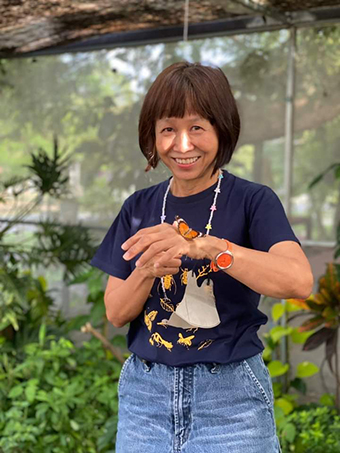

Yupa Hanboonsong is a Professor in Entomology at the Department of Entomology, Khon Kaen University. With a background in insect systematics and molecular genetics, she has been conducting research in economic entomology to address the region and country’s problems, including projects on sugarcane white leaf disease management and insects for food and feed. This made KKU a recognized pioneer in edible insect farming (cricket farming). She has been a long-term technical consultant on edible insects for FAO and was an international team leader for FAO project in Lao PDR on “Sustainable insect farming and harvesting for better nutrition, improved food security, and household income generation” and recently in 2022 for a project on “Understanding the use of insect-based protein source for animal and aquaculture feeds in Asia and the Pacific region”. She was co-author of FAO publications on edible insects, including Six-legged Livestock: edible insect farming, collecting, and marketing in Thailand (2013), Edible insects in Lao PDR: building on tradition to enhance food security (2014) and Guidance on sustainable cricket farming: a practical manual for farmers and inspectors (2022). She was also a partner and a technical consultant for the GREEiNSECT project in Kenya, supported by the DANIDA, Denmark. In addition, she pioneered the farming of black soldier fly and is currently conducting Thai government-sponsored training courses for farmers on the production and use of insect protein (black soldier fly) as a source of raw materials in animal feed. Professor Yupa is recognized both nationally and internationally as leader in the field of insects for food and feed.
Khon Kaen University, Thailand
August 28 (Wed)
8:15AM-9:15AM
Title: Edible Insects: Promises and Challenges
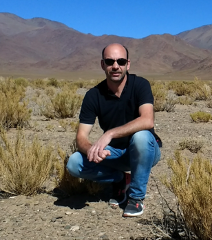

Juan C. Corley is a research scientist working for CONICET (National Research Council of Argentina). He is interested in the ecology and behaviour of forest insects and their parasitoids, investigating the relationship between ecological concepts with the sustainable management of pest species, especially invasive ones. He is also keen on the biology and management of invasive social insects. He has carried out research mostly in Southern Argentina but has acquired post-doctoral experience at the Université Claude Bernard (Lyon, France), at the University of Wales (Cardiff, UK) and at the North Eastern Research Station, Forest Service (West Virginia, USA) as a Fulbright scholar. Juan has been Editor-in-Chief for the International Journal of Pest Management from 2014 to 2020 and currently serves as Editor-in-Chief for Ecological Applications, a leading journal of the Ecological Society of America. He is also associate editor for Entomologia Generalis. He has published more than 120 articles in peer-reviewed journals and numerous technical, books chapters and popular-science articles. He is an Associate Professor at the Department of Ecology in the National University of Comahue (Patagonia, Argentina), and is also Director of the PhD program there. He is also founder and team leader of the Insect Population Ecology Laboratory at IFAB (Bariloche Institute of Forestry and Agricultural Research) and coordinates for IUFRO (International Union of Forestry Research Organizations) a working group on the ecology and management of bark and woodboring insects.
Website: https://sites.google.com/site/gepinsectos/gente-people/integrantes/jcorley?authuser=0
CONICET/National University of Comahue, Argentina
August 29 (Thu)
8:15AM-9:15AM
Title: Understanding the Population and Behavioral Ecology of an Invasive Forest Insect: Insights for Sustainable Pest Management
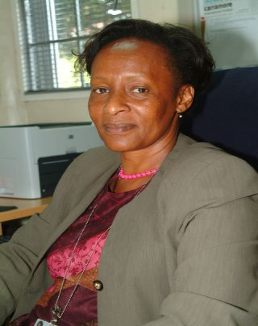

General Information
Rosemary Sang is an arbovirologist, research scientist with background in Medical Entomology (to PhD) and Medical Virology (to MSc) with over 35 year experience in field and laboratory studies on arboviruses. Dr Sang has worked for many years at the Ministry of Health, the Kenya Medical Research Institute (KEMRI)’s Centre for Virus Research, and engaged in vast collaborative research effort with different organisations including US Army medical research directorate (USAMRU-K) in Kenya and the International Centre of Insect Physiology and Ecology’s (ICIPE) Martin Luischer Emerging Infectious Diseases laboratory. Dr Sang has worked with and mentored strong arbovirus research teams to conduct extensive surveillance, discovery, outbreak response, and laboratory and field ecological and epidemiologic studies that have expanded the knowledge and understanding of the ecology and epidemiology of arboviruses of public health significance in Kenya and the surrounding region.
Employment, Positions and Responsibilities
Dr Sang rose through the ranks serving as a researcher in various capacities, from assistant Research Officer at the Ministry of Health, Research Officer to Chief Research Scientist at the Centre for Virus Research (CVR) of the Kenya Medical Research Institute (KEMRI). She also served as the head of Arbovirology and Haemorrhagic fevers (VHF) program and as Director of the centre for virus research of KEMRI, as coordinator for the implementation of a large consortium/collaborative research program, Arbovirus Incidence and Diversity (AVID) hosted by International Centre for Insect Physiology and Ecology ICIPE in collaboration with KEMRI and five other national institutions. She has served as consultant scientists at ICIPE, implementing diverse collaborative arbovirus project at the Matin Luischer Emerging Infectious Diseases (MLEID) laboratory. She has published widely generating > 120 publications in impactful peer reviewed scientific journals that are widely cited and is a recipient of various awards/recognitions. She has mentored MSc, PhD students in various universities in Africa (> 25 MSc and > 20 PhD students and Post-Doctoral Fellows).
Dr Sang is a member of the national polio certification committee, has been member of other national committees and also of WHO expert committees and working groups including the Scientific Advisory Group for the Origins of Novel Pathogens (SAGO).
Research Support
Dr Sang obtained research support from various donor organizations including WHO/TDR 2005-2008, DOD/GEIS 2006-2018, Google.org 2009-2012, NIH 2014-2019, Biovision 2017-2019, IDRC 2011-2014, SIDA 2011-2015, NORAD 2018-2013, Kenya National Research fund (NRF) 2020-2023 and DFG 2017-2024, to support implementation of arbovirus/VHF research, training, and mentorship. Some of her mentees have grown to become independent researchers in the field and are now serving in Kenya and other African countries.
AAS/ICIPE, Kenya
August 30 (Fri)
8:15AM-9:15AM
Title: Scaling Up Integrated Surveillance to Combat Arbovirus Transmission and Emergence, A Perspective from Kenya
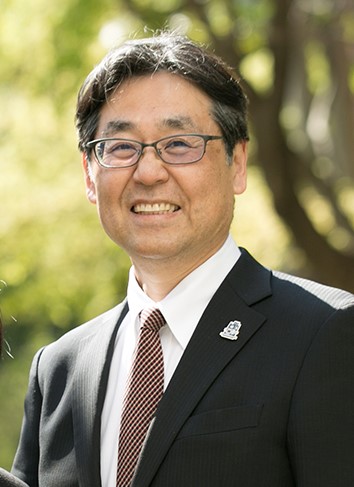

Ryohei Kanzaki is now a senior research fellow of Research Center for Advanced Science and Technology (RCAST), the University of Tokyo. He received his D.Sc. degree in Neurobiology from University of Tsukuba in 1986. From 1987 to 1990 he was a postdoctoral research fellow at the Arizona Research Laboratories, Division of Neurobiology, University of Arizona (John Hildebrand and Edmund Arbas laboratory). After serving as a professor at Institute of Biological Sciences, University of Tsukuba, he became a professor at Department of Mechano-Informatics, Graduate School of Information Science and Technology, the University of Tokyo. Then he was a professor at RCAST and director of RCAST from 2016 to 2022. He was a president of the Japanese Society for Comparative Physiology and Biochemistry (JSCPB) from 2012 to 2015.
Ryohei Kanzaki has been interested in brain mechanisms for generating adaptive behavior (i.e., biological intelligence) in insectrs. To elucidate the neural basis of the adaptive behavior (e.g., odor-source navigation), he implemented a model of the neural circuit reconstructed from single neurons, and integrated it with a mobile robot. Moreover, in order to understand the dynamics of the neural circuitry, he has developed an "insect-robot hybrid system" in which an insect or an insect brain controls a robot. Another important aspect of his research is devloping high sensitive- and selective-olfactory sensors based on olfactory receptor proteins of insects using a genetic engineering. He has developed unique approaches for understanding insect sensors and brains and has explored a novel engineeirng field to apply real biological intelligence acquired through evolution instead of AI to engineering. His interdisciplinary research will enable us to use the full potential of the features of insect sensors and brains as model systems for understanding the dynamical sensory and neural substrates of adaptive behaviors (i.e., biological intelligence) .
Ryohei Kanzaki has also made significant contributions to children’s science education as a chair of science and technology development projects by Japan Science and Technology Agency (JST).
The University of Tokyo, Japan
August 30 (Fri)
4:30PM-5:30PM
Title: Learning from Insect Intelligence - From a Nature-Centered Perspective -
By continuing to browse this website, you accept cookies which are used to offer a personalized experience on our website, generate statistics and realize advertising or social network tracking. Find out more about Cookie policy.
You can change your cookie settings at any time.
From 23 December to 4 January(Japan time)
The Management Office will be on holiday
We will reply after 5 January (JST) in turn.